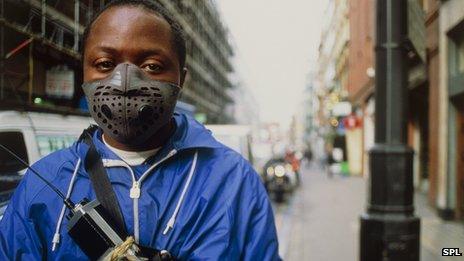How should cyclists protect against pollution?
- Published

It is not unusual for city streets to be filled with cyclists as well as cars and buses in the morning rush hour.
Following the publication of research showing that air pollution can cause heart failure in people with weak hearts, should cyclists be wary of breathing in toxic traffic fumes?
Blocking out gases such as carbon monoxide, ozone and nitrogen dioxide, as well as fine particulate air pollution - all contained in the exhaust fumes from buses, taxes and lorries - is a tall order.
But these are the harmful elements that can get into the lungs and into the bloodstream, and have a negative impact on our health.
Dr Vivienne Nathanson, head of science and ethics at the British Medical Association, says cyclists and pedestrians can get exposed to quite large doses of air pollution, particularly in big cities like London.
"Cyclists tend to be fitter people so they are out and exposed for long periods," she said.
"If they are cycling hard, they are breathing more heavily, which is good exercise, but they will get bigger doses."
Cycling face masks are an obvious remedy in polluted urban streets. A wide range is on offer, but it is not clear how effective they all are.
Alison Gowers, from Public Health England (PHE), said the use of a cycle mask was a personal choice.
"Use of a face mask may be an effective way of reducing exposure; however, it is dependent on ensuring that the masks fit correctly and are used according to the manufacturers' instructions.
"In those with pre-existing lung conditions, they may compound difficulties in breathing."
A couple of studies carried out in Beijing, China, have suggested that wearing an effective face mask might reduce the risk of adverse cardiovascular effects associated with exposure to particulate pollution, but PHE says more research is needed from other cities before they could be recommended in the UK.
'Sweaty'
Although masks for cyclists have been around for more than a decade, not many cyclists use them, says Chris Juden, technical officer from the national cycling charity CTC.
"We did test them but on the whole, the treatment was worse than the disease. They were hot and sweaty and they made it hard to breathe.
"I have a beard anyway, so there is no point," says Juden.
He also said it was important to replace the filter in the mask regularly or it would not work at all.
Asthma UK says that two-thirds of people with asthma find that traffic fumes make their condition flare up, so affected cyclists, or those with hayfever, may find a mask helpful.
But there are no masks which can keep out gases, such as ozone, which can be a problem for many people with asthma, particularly during hot weather.
Different route
Another way for cyclists to reduce their exposure to air pollution is to choose to travel on quieter routes with less traffic, away from diesel-powered buses and lorries.
Dr Nathanson says that "some form of safe separation" between cyclists and other traffic is required to reduce the risk of accidents and cyclists' exposure to air pollution.
Dr Cathryn Tonne, lecturer in environmental epidemiology at the London School of Hygiene and Tropical Medicine, agrees that wherever possible, cyclists should be separated from traffic and avoid sitting at major junctions behind belching vehicles.
"If an individual has to do something, then changing the path you cycle is most effective change to make."
Overall, everyone agrees that the health benefits offered by cycling outweigh any potential harm from pollution exposure.
Cycling saves on bus fares, it is great exercise and it helps clean up the air by reducing the number of cars on the road.
- Published10 July 2013
- Published24 June 2013
- Published8 August 2012
- Published17 April 2012
- Published28 January 2011
- Published23 June 2013